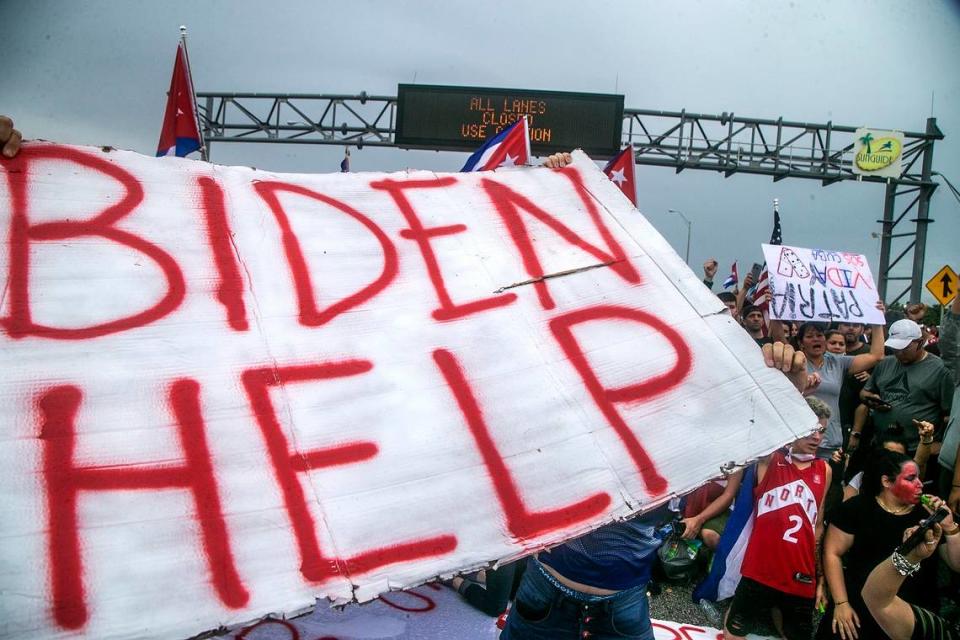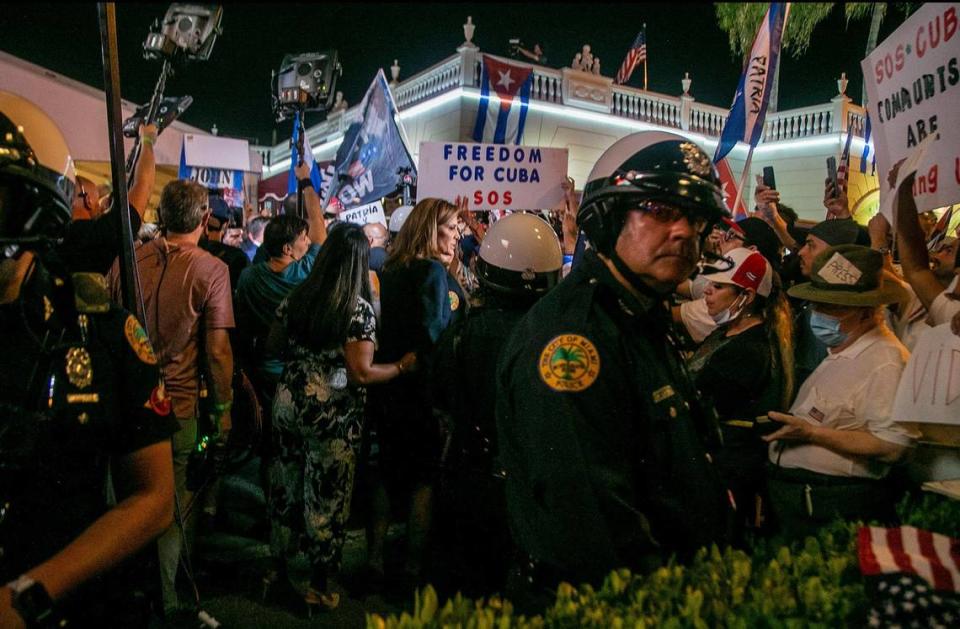Biden pokes South Florida hornet’s nest with announcement on Cuba policies
It took mere hours for President Joe Biden’s announcement of new measures towards Cuba — among them, relaxing travel restrictions and lifting Trump-era limits on remittances — to stir Florida’s hornet’s nest of diaspora politics, Miami.
And in South Florida, home to the largest Cuban community living in exile, it came from all corners: on Tuesday, early morning callers flooded into Spanish radio stations arguing for and against the measures, Florida politicians released scathing statements and local conservative media personalities predicted a swift rejection of Democrats at the polls in the midterms.
“I don’t like to say I told you so, but I told you so,” bragged local Cuban American YouTuber Alex Otaola during his three-hour live show on Monday night, which has over 90,000 views. “They [Democrats] have already given up on Florida, they have already given up on the Cuban American vote. They know that whatever they do, they won’t be able to get it back.”
It continued on Tuesday morning, with Roberto Rodríguez-Tejera, a longtime Miami veteran radio commentator and Actualidad Radio’s morning show anchor, celebrated the administration’s actions to restart the paused Cuban Family Reunification Parole Program that could help over 100,000 families in legal limbo but blasted the rushed and sudden rollout that has been the source of anger for many Cubans in South Florida.
“What I think is evident is the lack of communication from the White House with Miami, with those in exile, with valid spokespeople who can show support or disagreement legitimately,” Rodríguez-Tejera said on his show. “That’s the way things are done in the United States, and they can’t now send officials running to put out the fires they started themselves with their stupidity and arrogance.”
Does Miami’s reaction matter to White House?
The swift response from conservatives and some Democrats is just the latest example ratcheting up speculation that the Biden administration’s rollout of its foreign policy in Latin America is not as concerned with getting the stamp of approval from Miami’s Latinos, from the de-listing of Colombia’s FARC guerrillas from the State Department’s terrorism designation to opening talks with government officials in Venezuela. While Democrats have historically won Miami-Dade by 20-point margins or more, in 2020 Biden won the county by just eight points. Some polls suggest the rightward trend in Miami-Dade could hold for Democrats in the midterms.
“Given that the White House’s announcement immediately followed the Cuban regime’s rollout of its new penal code with harsh punishments for dissent, and the lack of buy-in from actual community leaders, one has to conclude that Democrats have written off Florida for the foreseeable future,” said Giancarlo Sopo, a Miami native who led Trump’s 2020 national Hispanic advertising.
The news also spread with significantly less histrionics that characterized the Trump administration’s rollout of its Cuba policy. In 2017, just a few months into his presidency, former President Donald Trump stood in a theater in Little Havana surrounded by Cuban American supporters to announce the tightening of travel restrictions to the island and other reversals to Obama-era policies of re-engagement with the island.
“Donald Trump really spoiled the Cuban American community by making every announcement with the Cuban community an event in South Florida. And expecting a subsequent president to live up to that performance is not very likely,” said Ricardo Herrero, Cuba expert and executive director of the nonpartisan Cuba Study Group. “Having said that, this administration should absolutely engage in more robust efforts with the Cuban American community and the South Florida community as a whole.”

U.S. Sen. Bob Menendez, New Jersey Democrat and chairman of the Senate’s Foreign Relations Committee, said he was “dismayed” that the Biden administration was authorizing group travel to Cuba “akin to tourism.”
“For decades, the world has been traveling to Cuba and nothing has changed. For years, the United States foolishly eased travel restrictions arguing millions of American dollars would bring about freedom and nothing changed. And as I warned then, the regime ultimately laughed off any promises of loosening its iron grip on the Cuban people, and we ended up helping fund the machinery behind their continued oppression,” Menendez said in a statement. He added he was pleased to see the State Department would keep Cuba on its “Restricted List” and welcomed the restart of the Cuban Family Reunification Parole Program.
Announcement comes amid broadening exodus
The new announcement on Cuba is happening as the U.S. deals with a deepening exodus from the island, with estimated numbers surpassing the “balsero” crisis in 1994 and Cubans becoming the third largest group of migrants trying to cross at the southwest border.
It is also less than two months away from the anniversary of the July 11 anti-government protests that rocked the island last year and resulted in hundreds of arrests, summary trials and widespread repression against dissenters. Last week, the Biden administration also gave approval to a U.S. company to invest in a private business in Cuba, an unprecedented move in over 60 years of the U.S. embargo on Cuba.
The announcement is also happening as Florida Democrats have announced new efforts to catch up to Republicans’ advantage in voter registration and outreach for Latinos, even as some fret locally over the GOP inroads in the Latino communities and battle against messaging that national progressive donors are leaving Florida behind.
“While it may reflect priorities for the Biden administration, the Cuban issue is one that is pregnant with political considerations,” said Fernand Amandi, Miami-based Democratic pollster and political consultant. “Therefore, one has to ask what, if any, are the political consequences for a stark reversal without a contextual explanation.”
New policies but strict sanctions, too
Biden’s supporters counter that the new measures on Cuba, a promise Biden made during his campaign for president, are still coupled with stricter sanctions that the U.S. announced last year against Cuban officials and entities in response to the repression after the July 11 protests.

The White House also released a statement with the announcement calling on Cuba to “immediately release political prisoners, to respect the Cuban people’s fundamental freedoms and to allow the Cuban people to determine their own futures.”
Manny Diaz, former Miami mayor and now chair of the Florida Democratic Party, said in a statement the new policy will “help prevent hundreds of deaths in the Florida Straits and save countless Cubans from the dangerous trek through Central America and Mexico that can lead to countless tragedies.”
And U.S. Rep. Val Demings, who is running for Senate against U.S. Sen. Marco Rubio, conceded she did not agree with some parts of the new policies.
“I am encouraged by policies that will reunite families and raise the cap on family remittances, but allowing investments in the Cuban private sector and easing travel restrictions will only serve to fund the corrupt dictatorship,” she said.
Meanwhile, Florida Republicans seized on the announcement, releasing a joint statement with other Republican colleagues calling the new policies a “betrayal” and “appeasing Cuba’s murderous regime.”
“The Biden administration’s repeated appeasement to the Cuban dictatorship is a betrayal of America’s commitment to human rights and freedom, and to the long-suffering Cuban people who are struggling for a genuine democratic transition,” read the statement, which included signatures from Rubio, Sen. Rick Scott and Miami U.S. Reps. Maria Elvira Salazar, Mario Diaz-Balart and Carlos Gimenez.
Despite the backlash, the Biden administration’s move isn’t as unpopular as the loudest voices have suggested, said Herrero, the Cuba expert. Policies like reuniting families from the island with those abroad and making travel to the island easier for Cubans with family back home are supported by Cubans in Miami, Herrero said, adding that Cuban Americans did have input on the White House’s policy in the months leading up to its announcement.
“He’s turning the page. This policy turns the page on a maximum-pressure campaign that, while it played very well politically in South Florida, only served to undermine our national interests in the region and to aggravate the root causes driving migration out of Cuba,” Herrero said. “So it’s really a case of good politics, horrible policy that this administration is finally turning the page on.”


